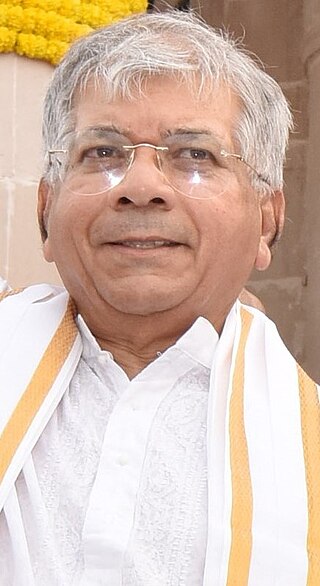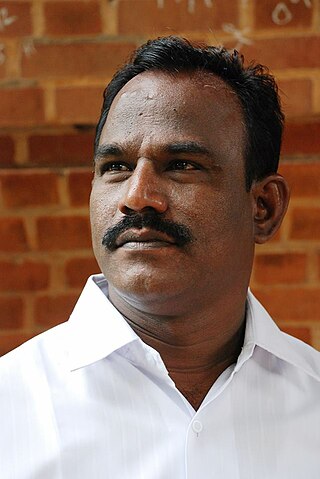
Bandaru Dattatreya is an Indian politician serving as the current governor of the State of Haryana since 2021. He was also the 20th governor of Himachal Pradesh and was the member of Lok Sabha for Secunderabad from 2014 to 2019. He belongs to the Bharatiya Janata Party (BJP).
Balbir Punj is a journalist and columnist from India who has written on current events in Hindi-English newspapers and magazines since the early 1990s. He specializes in writing about social, economic, and political issues.

Githa Hariharan is an Indian writer and editor based in New Delhi. Her first novel, The Thousand Faces of Night, won the Commonwealth Writers' Prize for the best first novel in 1993. Her other works include the short story collection The Art of Dying (1993), the novels The Ghosts of Vasu Master (1994), When Dreams Travel (1999), In Times of Siege (2003), Fugitive Histories (2009) and I Have Become the Tide (2019), and a collection of essays entitled Almost Home: Cities and Other Places (2014).

Ilavenil Meena Kandasamy is an Indian poet, fiction writer, translator and activist from Chennai, Tamil Nadu, India.
Dalit literature is a genre of Indian writing that focuses on the lives, experiences, and struggles of the Dalit community, who have faced caste-based oppression and discrimination for centuries. This literature encompasses various Indian languages such as Marathi, Bangla, Hindi, Kannada, Punjabi, Sindhi, Odia and Tamil and includes diverse narratives like poems, short stories, and autobiographies. The movement originated in response to the caste-based social injustices in mid-twentieth-century independent India and has since spread across various Indian languages, critiquing caste practices and experimenting with different literary forms.

Prakash Yashwant Ambedkar, popularly known as Balasaheb Ambedkar, is an Indian politician, writer and lawyer. He is the president of political party called Vanchit Bahujan Aaghadi. He is a three-time Member of Parliament (MP). He was a member of the 12th and 13th Lok Sabha of India and twice represented the Lok Sabha constituency of Akola, Maharashtra. He has served in both houses of the Indian Parliament.
Bama , also known as Bama Faustina Soosairaj, is a Tamil Dalit feminist, teacher and novelist. Her autobiographical novel Karukku (1992) chronicles the joys and sorrows experienced by Dalit Christian women in Tamil Nadu. She subsequently wrote two more novels, Sangati (1994) and Vanmam (2002) along with three collections of short stories: Kusumbukkaran (1996) and Oru Tattvum Erumaiyum (2003), 'Kandattam'(2009). In addition to this, she has written twenty short stories.
Gogu Shyamala is a Telugu-language writer and women's activist and a prominent Dalit.

Imayam is an Indian Tamil-language novelist from Chennai, Tamil Nadu. He has eight novels, eight short story collections and a novella to his credit. Widely acknowledged for his realist mode of writing, his stories are known for their incisive exploration of societal intricacies. Closely associated with the Dravidian Movement and its politics, he is considered as one of the leading writers from South India. He is the recipient of the honorary Sahitya Akademi Award for his novel Selladha Panam in 2020. He is also the first Tamil writer to receive the Kuvempu Rashtriya Puraskar National Award (2022) for bringing new sensibilites to Tamil literature through his writings. Noting the writer's proclivity to Dravidian ideals, the Tamil Nadu chief minister M.K.Stalin called him "an ideologue donned in black and red". He lauded Imayam calling him a "proactive writer" in the Dravidian movement.

Rohith Chakravarthi Vemula was an Indian PhD scholar at the University of Hyderabad. From July 2015 to December 2015, the university stopped paying Rohith his monthly stipend of ₹25,000 till December 2015, with friends alleging that he was targeted for raising issues on campus under the banner of Ambedkar Students' Association (ASA), an Ambedkarite student organisation.
Yashica Dutt or Yashica Dutt Nidaniya is an Indian writer and freelance journalist who has written on topics including fashion, gender, identity, culture and caste. Following the response to her 2016 blog post, ‘Today, I’m coming out as Dalit‘, Dutt published "Documents of Dalit Discrimination" on Tumblr and the book Coming Out as Dalit, which received a Sahitya Akademi award.

The Unbearable Being of Lightness is a 45-minute documentary film made in 2016 and directed by Ramchandra PN. The documentary documents a workshop that the filmmaker had conducted for a group of students at the University of Hyderabad, immediately after the student protests on the issue of the suicide of Rohith Vemula had ended at the university.
The Death of Merit is a four-part documentary series. The first three parts were created by the Insight Foundation, a Dalit-Adivasi student group. The fourth was posted by Round Table India. The whole series has been edited by Gurinder Azad and team. The documentary series focuses on caste-based discrimination in the Indian higher education system and the suicides of Dalit students in Indian campuses. The Wire, states that the "Death of Merit, remains one of the most crucial documentations of forms of discrimination faced by Bahujan students in university spaces."
Dalit Camera is a news website and YouTube channel set up in 2011 by Raees Mohammed to document life in India from the perspective of Dalit, Adivasi and Bahujan people and other minorities living in India. It has been described as the first use of videos uploaded on social media to highlight the difficulties faced by Dalit students.
Sanghapali Aruna, also known as Sanghapali Aruna Lohitakshi, is a human rights activist from India, best known for her work on Dalit women's rights. She is the Executive Director of Project Mukti.
The Payal Tadvi or Payal Salim Tadvi suicide case is an ongoing criminal case in the Maharashtra state of India. Payal allegedly committed suicide on May 22, 2019, after facing harassment by three of her seniors at Topiwala National Medical College and BYL Nair Hospital. A case has since been brought against three of her former colleagues due to claims of harassment relating to Payal's caste status.
Radhika Vemula is an Indian activist for Dalit rights and against caste based discrimination.

Ambedkar International Center is a civil rights advocacy group that was formed in 2012 to fight against caste discrimination in the United States. The organization's mission is to strengthen unity among scheduled castes (SCs), scheduled tribes (STs) and other backward classes (OBCs) living in the United States of America. The organisation is named after the Indian social activist and caste reformer, Bhimrao Ramji Ambedkar.








